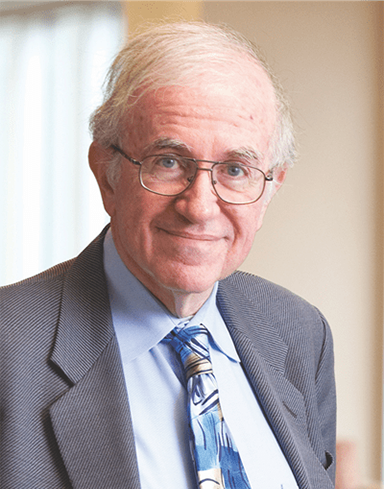 Einhorn
EinhornBy Brian Hartz
Saturday, June 29, 2019
Testicular cancer, though rare, is a cancer that primarily affects young men. It also differs from other forms of cancer in that it has a high cure rate — but first, it has to be detected.
We asked the world’s foremost authority on testicular cancer, Dr. Larry Einhorn, the Livestrong Foundation Professor of Oncology and professor of medicine at IU School of Medicine and a physician scientist at IU Simon Cancer, about what can be done to discover and treat testicular cancer.
Q: What is the average age of a testicular cancer patient?
A: Most patients are teenagers or in their 20s or 30s, so it is a young man's disease.
Q: What are the signs of testicular cancer that men should watch for?
A: Twenty years ago when Lance Armstrong was diagnosed, he did a great job in raising public awareness. If a man feels pain in the testis or a fullness, a mass or a hardness in the testis, he shouldn't assume that it is just an infection or nothing of consequence. It should be checked out by a physician who will determine whether it is anything serious. Patients can’t do their own physical examination and make this diagnosis.
Q: Do men tend to overlook or minimize the signs and symptoms? Is that something you see contributing to occurrences of testicular cancer?
A: I think men are less apt to overlook the symptoms now than before testicular cancer became more openly discussed. However, when you are 25 years old, which is the average age, the thought of getting cancer just doesn't cross your mind. And so there can be anywhere from a several-week to a several-month delay from the time a patient has the first symptoms to the time that the patient sees a doctor.
Q: Is it a type of cancer that a man could be genetically predisposed to get?
A: Well, yes and no. It occurs in only 1 percent of all men who have cancer so it is a relatively rare disease. We see about 8,000 to 9,000 new cases a year. The known risk factor for getting testis cancer is being born with an undescended testis where, as a small child or an infant, a pediatrician will arrange for a surgeon to push the testis back into the scrotum. If you have a brother or a father, what we call a first-degree relative, who had testis cancer, instead of the standard risk of 1 out of 400, it becomes a risk of 1 out of 300. So yes, it's an increased risk if you have a relative with testis cancer, but it's still a very rare disease.
Q: Are there any behavioral or lifestyle changes that someone can do to help prevent testicular cancer?
A: Unlike lung cancer which can occur in heavy smokers, many cancers -- such breast cancer and many other types of cancer -- there is no definitive reason people get it. Many times, people get malignancies just as they get heart disease or neurological diseases, for no particular reason.
Q: If a man gets screened and receives a testicular cancer diagnosis, what should his next steps be?
A: Once you have an ultrasound done and a mass is identified in the testis, the next step is to see a urologist, who will make an incision in the groin and surgically remove the testicle. Then the patient will receive tests to see whether the cancer is confined to the testis or whether it has spread to other parts of the body. That will determine whether the treatment will be observation alone after removal of the testis, or surgery to remove abdominal lymph nodes, or chemotherapy if the disease has metastasized and is more widespread.
Q: What is the outlook for testicular cancer patients whose disease has become metastatic?
A: As is true with many cancers, the more extensive the disease, the harder it is to cure, but testis cancer is unique among all malignancies in that it has such a high cure rate. So, if we look at all patients who have metastatic disease that require chemotherapy, about 70 percent will be cured with their initial chemotherapy. Of the remaining 30 percent who are not cured with their initial chemotherapy, about half of those will be cured with subsequent chemotherapy. So, about 80 percent to 85 percent of patients will be cured.
Q: Can a man usually maintain his current lifestyle while undergoing treatment for testicular cancer?
A: Absolutely, and sexual function is not affected. The other remaining testis will work overtime and produce the amount of testosterone previously produced by both testicles. There are some patients for whom the testicle doesn’t work overtime and those patients will need to be on what we call replacement testosterone, which can be done as a gel applied to the skin once a day, or as an injection every two or three weeks. Most patients who are cured either with surgery alone or surgery plus chemotherapy are soon back to work and doing normal activity.




